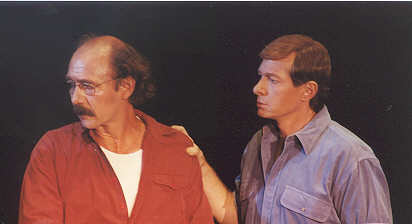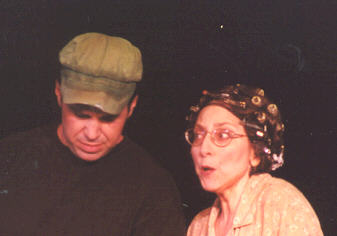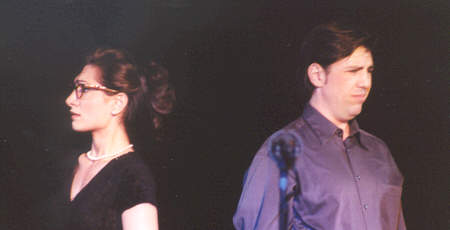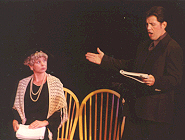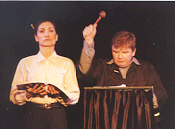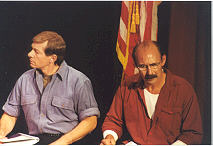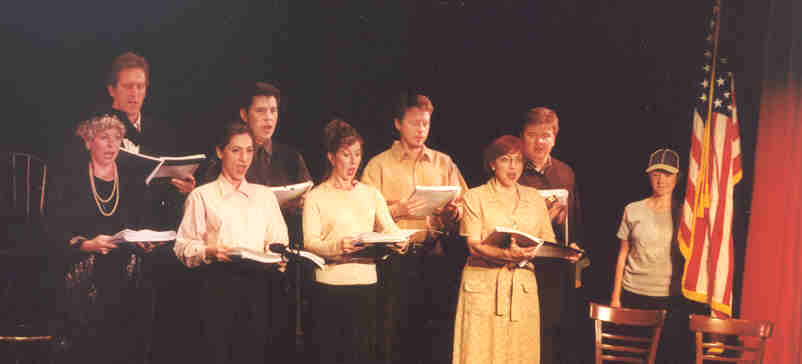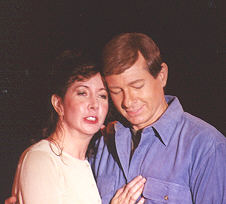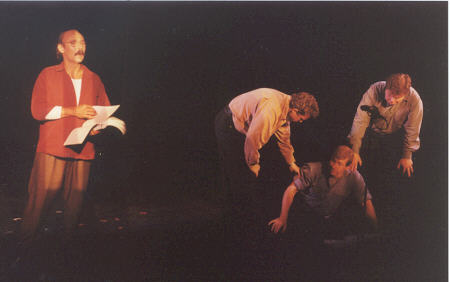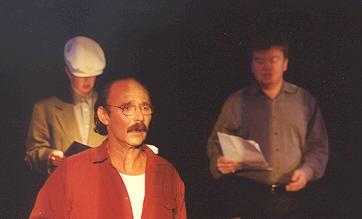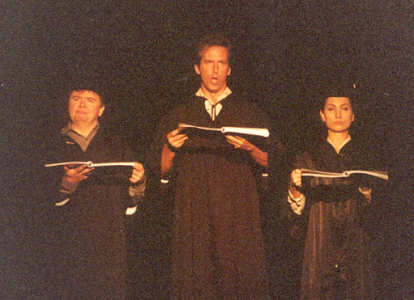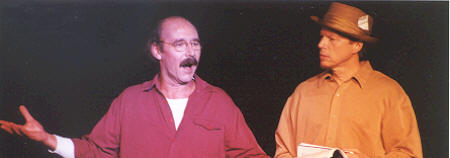Press comments:
Daniel Felsenfeld, andante.com:
"The power of the completed
Sacco and Vanzetti
.... shone through... as an event of this magnitude deserves."
Joseph Pehrson,
The New Music Connoisseur:
"It was as if, miraculously,
Marc Blitzstein arose from the dead
just to complete this important work."
Tom Nissley, The Ridgelea Reports:
"a tour de force...
Gregory Mercer's fine tenor voice haunts and captivates as Nicola Sacco.
James Sergi also convinces us completely in the role of Bartolomeo Vanzetti,
Monica Harte's magnificent Rosa Sacco will go home with you,
and that is true also of Tammy Hensrud's Elizabeth Glendower Evans.
From first note to last I trembled at
Robert Osborne's rich basso
as the district attorney.
In the courtroom his singing blended
with Steven Tharp's powerful tenor as Judge Thayer, and Tara Venditti's clear mezzo rendering of the clerk.
Baritone Lars Woodul and
tenor Mark Wolff round out
this magnificent cast, along with soprano Helene Williams,
who is well established in Blitzstein and Lehrman roles."
Other comments:
Frank Corsaro:
"Your long, arduous work has resulted in an intriguing epic poem, a critical view of American justice. It's a devout work. It deserves its place."
E. Randahl Hoey:
"an opera of stunning intensity that feels and sounds like Blitzstein throughout."
Charles Osborne:
"a performance by a gifted and dedicated cast of a highly gripping and moving opera. This Sacco and Vanzetti is a work of tremendous size and scope, a challenging piece of theater that deserves to be performed. A masterpiece."
Mark Grant:
"The performers were wonderful."
Peter Dizozza:
http://888.blogspot.com, 8/19/01:
"The Phenomenon of Leonard Lehrman -- a composer on the fringes of greatness... Leonard's muse, for the past 12 years, is the talented singer/actress Helene Williams. She is to him what Lotte Lenya was to Kurt Weill... I relate to him, and feel that my work is a product of being exposed and involved with his work.... There is iron within him.... He writes beautiful music and draws our attention to other work, particularly the work of Marc Blitzstein. He devotes his life to music and through it to other causes to which he's given his respect and which deserve our attention--Emma Goldman, the innocence of Sacco and Vanzetti and Julius and Ethel Rosenberg, The Long Island Music Scene including Joel Mandelbaum, the performing genius of Tom Lehrer. I acknowledge him now for completing the opera begun in 1960 by Marc Blitzstein and left incomplete at his death in 1964, Sacco and Vanzetti."
Peter Dizozza, http://Michaeldouglas@blogspot.com
8/21/01:
"I was assistant conductor for Leonard Lehrman's Cantata setting the text of the Julius and Ethel Rosenberg letters, entitled We Are Innocent. The Federal Government executed them, with the help of Roy Cohn, I believe, for managing to give Russia the bomb..., an amazing accusation given their level of education, and again, Julius and Ethel were caught feeling guiltily aware of feeling disagreeably sympathetic to communists during a gung-ho feeling period -- the American/Un-American Fifties.
So Leonard Lehrman musically ritualizes inflammatory lynchings, and his work clarifies our perception. Rather, he shapes our views. If you ask me, all I know of the subjects is from him. All I know of Americans in Japan is from Spielberg/Ballard's Empire of the Sun. All I know about Leo Frank I learned in the Harold Prince production of Parade. Huxley wrote The Devils of Loudun and Ken Russell illuminated it. Seeing a flawed man, innocent of the crime for which he is accused, executed, is a ritual. Will it never happen again? Let's learn from these re-enactments."
Sara R. Koritz:
"I am an active member of the Community Church of Boston, founded in 1920. The Church took an active role in defense of Sacco and Vanzetti until their execution in 1927. These two strands of my life merged into exciting expectation when I learnt that Leonard Lehrman's work on the opera, Sacco and Vanzetti, based on Marc Blitzstein's notes, had been completed. I immediately made arrangements to be present at the opening performance. We were elated by the concert, by the beauty of the music, and the clarity of the opposing positions expressed in the lyrics.
I hope backers will be found to bring this opera to a wide public."
Terry Winter Owens:
I found Dukakis's statement at the conclusion of Sacco and Vanzetti to be eloquent and most appropriate. I congratulate you for your wonderful work on this opera and your decision to end with the Dukakis quotation. I believe Marc Blitzstein would have expressed hearty approval of your work as well as for your decision to end the opera in this particular way.
